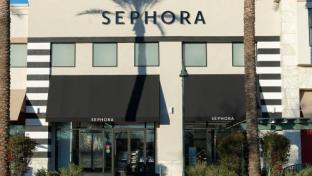The Tech Ulta Beauty & Sephora are Banking on to Reimagine the Beauty Industry
Beauty retailers Sephora and Ulta Beauty have made a living through services and the model of letting consumers’ try-before-they-buy. Yet both of these tactics fall under new pressures amid today’s COVID-19 regulations and concerns.
As stores begin to open up, the two will see how consumers react to a new shopping experience. Ulta started reopening on May 11 and now has around 330 stores (about a quarter of its fleet) open for retail, with 283 of those stores offering salon services. The retailer said 800 stores offer curbside pickup, while Sephora has refrained from launching curbside service.
Sephora stores began reopening on May 22 has more than 100 reopened (out of 490 stores across the Americas), but it is not offering services, including makeovers, skincare treatments, or in-store classes. Ulta is offering services by appointment only, performing associate and client wellness checks, using protective wear, increasing cleaning between appointments, and implementing social distancing between stations.
COVID-19 has hastened channel shift across retail, Ulta CEO Mary Dillon said during the retailer’s recent earnings call.
“We believe much of this new consumer behavior will be sticky,” she noted. “So we're focused on how we can move even faster to win in an omnichannel world.”
To this end, the company is accelerating investments to expand its shipping capacity this year and ship-from-store capabilities.
As both retailers reopen, here are two areas of retail technologies they are employing to respond to shopping behaviors altered by the coronavirus.
Virtual Testing
“The opportunity to test and play is an important part of the beauty shopping experience,” Dillon said. “So while we've kept most testers on the sales floor to help guests visualize color, texture and packaging, we've made them unavailable for guest use.”
As an alternative, Ulta is pushing its GLAMlab tool, an interactive virtual experience within the Ulta Beauty app, which allows users to virtually discover and try thousands of beauty products. According to Dillon, since the crisis began, guest engagement with the tool has increased nearly five times, and more than 30 million shades have been tested virtually.
“We're reimagining the guest experience in product discovery and looking at ways technology, services and the role of our associates can evolve to create a new wow experience for our guests,” Dillon said. “Our Ulta Beauty app and GLAMlab tool will continue to play a big role in guest discovery and trial. Today, guests can use GLAMlab to match foundation, try on makeup, and play with hair color and lashes. And in the future, guests will have even more opportunities as we accelerate the implementation of new categories and experiences.”
Sephora also announced testers in its stores will be for display only. The retailer offers a suite of virtual tools, including Sephora Virtual Artist, to aid in product selection. Sephora Color IQ technology scans the surface of skin and assigns it a special number, which reveals scientifically precise foundation, concealer, and lip recommendations. Consumers can learn to recreate trends with instructions that actually map out where to place the product on their face, how to blend them, and which products are needed to achieve the look. They can also compare color swatches from a range of brands side-by-side on a virtual arm.
Loyalty Programs
Loyalty programs serve an important bridge between digital and physical commerce. Well timed, Sephora just released the next evolution of its free Beauty Insider loyalty program.
The program, which launched in February 2007, features a members-only mobile and online platform that serves as a destination to find inspiration, ask questions, post beauty looks and get product recommendations in an unsponsored, real-time social setting.
“We know [clients] want more ways to save and even more access to things like products, brand founders, services and one-of-a-kind experiences that are unique to Sephora,” Allegra Stanley Krishnan, VP and GM of Loyalty, Sephora, said in a press release of the updates. “We also know rewards that provide greater emotional and memorable experiences are the most meaningful for our clients, and we want to continue to deliver personalized experiences where our clients can choose what works best for their needs. The emotional component of loyalty is a vital driver of our loyalty program and what really matters most to our clients.”
One of the biggest changes to the loyalty program is the new Beauty Insider Cash, which allows members with 500 points to choose $10 off at checkout online and in-store. All members will also get free standard shipping, although level of membership will matter. Rouge members can enjoy this with all purchases, VIB on purchases of $35 or more, and Insiders when they spend $50.
Additionally, as soon as social distancing restrictions are lifted, members will be able to exchange their points for exclusive experiences like a one-on-one meet-up with a brand founder, a facial from a skincare guru, or a chance to see how their favorite product is made.
Other updates include Discount & Point Multiplier Events where members can earn points faster and exchange points for savings, expanded birthday gift categories, and, beginning this fall, Rouge members will get first access to the biggest product launches.
Meanwhile, Ulta said its Ultamate Rewards program has more than 33 million active members, which provides the retailer with valuable customer insights.
“We're applying advanced analytics and artificial intelligence to leverage this data to deliver personalized targeted communications,” Dillon said.
The number of active members increased 2% in Ulta’s Q1 2020, compared to the first quarter last year, which she noted was lower than planned, but was in spite of the store closures, which have been the largest source of new member acquisition historically.






